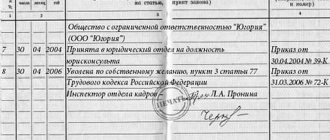What it is?
Disciplinary liability is a type of legal liability imposed on an employee who does not comply with discipline. It occurs when an employer or other authorized person is dissatisfied with the employee’s actions and condemns him by imposing a disciplinary sanction.
Disciplinary liability is introduced to:
- to form a certain behavior among company employees that does not allow illegal acts;
- prevent non-compliance with labor discipline requirements;
- develop a clear understanding among employees of possible and unacceptable behavior at work;
- restore previously existing social relations between individual members of the work team.
Disciplinary responsibility should not be confused with administrative responsibility . The second comes in if someone has committed an administrative offense – i.e. violated the rules of conduct adopted by authorized government bodies. This applies to non-compliance with safety regulations, traffic rules, fire safety principles and other things.
Legislative regulation
Disciplinary liability is regulated by legislation operating on the territory of the Russian Federation. A document that fully reflects the essence of the procedure and its features is the Labor Code. Information reflecting the essence of punishments is listed in Chapter. No. 30.
as the fundamental documents when studying the issue of responsibility for ignoring discipline:
- No. 191: situations in which a subordinate earned a reward for some kind of work;
- No. 192: violations for which disciplinary sanctions are legal;
- No. 193: how and when penalties are appropriate;
- No. 194: elimination of disciplinary sanctions by decision of a manager;
- No. 195: application of responsibility for misconduct, punishment of the management of the company or individual unit.
The Labor Code does not contain a list of serious offenses that a citizen must commit in order to be fired. However, such lists can be found in special acts for highly specialized specialists.
For example, the Regulations on the discipline of workers in railway transport provide for punishment for serious violations of discipline, due to which the health and lives of citizens were in danger , the safety of the movement of electric transport and the integrity of cargo were violated.
The list of such violations and the persons responsible for this was established by the Ministry of Railways together with the committee of the independent railway workers' trade union.
Examples of special disciplinary responsibility
The legislation of the Russian Federation establishes special disciplinary liability, for example, for the following categories of persons:
customs officers for violation of official discipline bear disciplinary liability in the form of the following disciplinary sanctions (Article 29 of the Federal Law of July 21, 1997 N 114-FZ (as amended on July 31, 2020) “On Service in the Customs Authorities of the Russian Federation”):
- comment;
- rebuke;
- severe reprimand;
- warning about incomplete professional compliance based on certification results;
- dismissal from customs authorities.
civil servants for committing a disciplinary offense bear disciplinary liability in the form of the following disciplinary sanctions (Article 57 of the Federal Law of July 27, 2004 N 79-FZ (as amended on March 24, 2021) “On the State Civil Service of the Russian Federation”):
- comment;
- rebuke;
- warning about incomplete job compliance;
- dismissal from the civil service.
prosecutorial employees for failure to perform or improper performance of their official duties and commission of offenses that discredit the honor of a prosecutorial employee bear disciplinary liability in the form of the following disciplinary sanctions (Article 41.7 of the Federal Law of January 17, 1992 N 2202-1 (as amended on December 30, 2020) “ About the Prosecutor's Office of the Russian Federation":
- comment;
- rebuke;
- severe reprimand;
- demotion in class rank;
- deprivation of the badge “For impeccable service in the Prosecutor’s Office of the Russian Federation”;
- deprivation of the badge “Honorary Worker of the Prosecutor's Office of the Russian Federation”;
- warning about incomplete professional compliance;
- dismissal from the prosecutor's office.
employees of internal affairs bodies for violations of official discipline, as well as in other cases provided for by law, bear disciplinary liability in the form of the following disciplinary sanctions (Article 50 of the Federal Law of November 30, 2011 N 342-FZ “On Service in the Internal Affairs Bodies of the Russian Federation and introducing amendments to certain legislative acts of the Russian Federation"):
- comment;
- rebuke;
- severe reprimand;
- warning about incomplete professional compliance;
- transfer to a lower position in the internal affairs bodies;
- dismissal from service in internal affairs bodies.
Disciplinary offense
The main precursor to the imposition of a disciplinary obligation is a disciplinary offense - ignoring or misinterpreting the duties assigned to him.
A disciplinary offense is characterized by certain factors:
- It is performed by an employee who has an employment relationship with the management of an organization, and an agreement has been concluded between them.
- The offender is fully capable and can perform the functions delegated to him.
- The employee , through his own fault, did not fulfill or negligently performed the duties described in the concluded contract, internal regulations, labor legislation, instructions for the position and other acts. For example, he did not follow the daily routine while working, came drunk, was negligent in his duties, etc.
- The act of the offender significantly harmed the enterprise or employer; it is possible to trace the path from the action or inaction of the person to the harm caused.
The social relations violated by the act (the object of the offense) are the labor regulations within the enterprise . The meaning of a disciplinary offense is suggested by Art. 192 Labor Code of the Russian Federation. According to the document, mistakes based on the nature of the object are conditionally divided into 4 groups:
- spending working time at your own discretion: absenteeism, being late, leaving the workplace without permission;
- ignoring the rules for the careful and appropriate use of the employer’s property;
- an attempt on the system of coordination of work processes: failure to comply with orders, reasonable instructions and orders;
- attacks on the life, physical and moral condition of a colleague or the team as a whole: non-compliance with labor protection and safety rules.
A violator of discipline at work will have to go through the consequences of disciplinary action .
Disciplinary liability of certain categories of employees
Handbook of a practicing lawyer on labor law A.V. Sutyagin, V.A. Ershov, I.A. Tolmachev “GrossMedia”, 2008 “Rosbukh”, 2008 Source: SPS Consultant+
Article 189 of the Labor Code of the Russian Federation provides that for certain categories of workers, charters and regulations on discipline approved by federal laws may apply. Until the entry into force of these regulatory acts, the charters and regulations approved by the President and the Government of the Russian Federation are in force. In particular, the Regulations on the discipline of railway transport workers of the Russian Federation (approved by the Decree of the Government of the Russian Federation of August 25, 1992 N 621), the Charter on the discipline of employees of organizations with particularly hazardous production in the field of the use of nuclear energy (approved by the Decree of the Government of the Russian Federation of July 10, 1998 N 744 ), Charter on the discipline of maritime transport workers (approved by Decree of the Government of the Russian Federation of May 23, 2000 N 395), Disciplinary Charter of the Customs Service of the Russian Federation (approved by Decree of the President of the Russian Federation of November 16, 1998 N 1396). These regulations establish requirements for labor discipline in the relevant industries, related to the peculiarities of their functioning.
The need to regulate labor discipline issues in railway transport is due to the following factors. Railway transport forms the basis of the transport system of the Russian Federation and is designed to ensure timely, complete and high-quality satisfaction of the transportation needs of the population, the national economy and the country's defense.
In order to ensure the safety of train movement and shunting work, the safety of transported goods, luggage and other entrusted property, as well as to avoid situations that threaten the life and health of passengers, employees of enterprises, institutions and organizations of railway transport are required to be highly organized in their work and impeccable performance of labor responsibilities.
Violation of discipline in railway transport creates a threat to the life and health of people, the safety of train traffic and shunting work, the safety of transported goods, luggage and other entrusted property, and also leads to failure to fulfill contractual obligations.
The regulations on the discipline of railway transport workers, based on the labor legislation of the Russian Federation, determine the special conditions for compliance with discipline by railway transport workers and disciplinary measures in case of violation of such conditions.
In accordance with paragraph 5 of the Regulations, railway transport workers are assigned the following responsibilities:
A) ensure the safety of train traffic and shunting operations, timely delivery of goods and passengers, comply with train schedules, and reduce rolling stock downtime;
B) take care of technical means of railway transport (locomotives, cars, tracks, communications equipment and others), as well as equipment, materials and objects of railway transport, ensure the safety of transported goods, luggage and other entrusted property, take measures to prevent and suppress cases of their theft ;
C) comply with the rules and regulations on labor protection, safety and environmental protection;
D) take care of passengers, providing a high standard of service.
If an employee commits a disciplinary offense, in addition to those provided for by the labor legislation of the Russian Federation, the following types of disciplinary sanctions established by paragraph 15 of the Regulations may be applied to him:
A) deprivation of the driver’s certificate for the right to drive a locomotive, motor-car rolling stock, special self-propelled rolling stock, the driver’s certificate for the right to drive a trolley, the assistant driver of a locomotive, motor-car rolling stock, special self-propelled rolling stock - the certificate of an assistant driver, assistant driver handcars - driver's assistant certificates for a period of up to three months or up to one year, with transfer to another job with the employee's consent;
B) release from a position related to the operational work of railways, industrial railway transport enterprises or other work to ensure the safety of train traffic and shunting work, the safety of transported goods, luggage and other entrusted property, labor protection legislation with the provision, with the consent of the employee, of the procedure for transferring other work;
B) dismissal.
Disciplinary action in the form of deprivation of the driver's certificate for the right to drive a locomotive, motor-car rolling stock, special self-propelled rolling stock, the driver's certificate for the right to drive a trolley, the assistant driver of a locomotive, motor-car rolling stock, special self-propelled rolling stock - the certificate of an assistant driver, handcar driver's assistant - a driver's assistant's license for a period of up to three months can be applied for the commission of an offense by the driver, driver, driver's assistant, driver's assistant, which created a threat to a crash or accident, the life and health of people.
A disciplinary sanction in the form of dismissal from a position with the provision, with the employee’s consent, of transferring another job may be imposed on an employee for committing a disciplinary offense that poses a threat to the safety of train traffic and shunting work, the life and health of people, or for violating established rules of transportation and official duties for servicing passengers, ensuring the safety of cargo, luggage and other entrusted property, violation of labor protection legislation, resulting in injury or death.
A disciplinary sanction in the form of dismissal may be imposed, except in cases provided for by the labor legislation of the Russian Federation, also for an employee committing a gross violation of discipline that creates a threat to the safety of train traffic, shunting work, the life and health of people, or leads to a violation of the safety of cargo, luggage and entrusted property, failure to fulfill official duties to serve passengers.
A disciplinary sanction may be imposed by a manager who has the right to hire an employee who has committed a disciplinary offense. Each superior manager can fully exercise disciplinary rights belonging to subordinate managers in relation to employees of enterprises, institutions and organizations subordinate to them.
An employee who has committed an offense that threatens the safety of train traffic and shunting work, the life and health of people, is suspended from work for that working day (shift) by the official exercising administrative or control and inspection functions at this site, with immediate notification of this to the relevant manager. The notice must detail the reasons and circumstances that led to the removal from work.
Suspension from work without sufficient grounds entails liability for the guilty official in accordance with the established procedure.
The Charter on the discipline of employees of organizations with particularly hazardous production in the field of nuclear energy establishes the labor rights and obligations of employees of the relevant organizations, additional to those established by the Labor Code of the Russian Federation.
An employee of such an organization is obliged to:
A) help ensure the reliability and safety of the operation of facilities with particularly hazardous production in the field of nuclear energy, be constantly prepared to prevent and eliminate emergency situations, accidents and prevent their development, in the event of an emergency, act in strict accordance with emergency instructions and the liquidation plan accidents;
B) arrive at work when called by the administration to eliminate an accident or prevent it;
C) know and strictly comply with established technological regulations, technological processes for performing work, job and production instructions, as well as rules and regulations on nuclear and radiation safety, labor protection, safe work, technical operation and repair of equipment, industrial sanitation and occupational hygiene, fire safety, environmental protection and other rules and regulations related to his work activities;
D) observe production discipline, the established procedure for storing documents, nuclear and radioactive materials, exercise vigilance, strictly maintain state, official and commercial secrets, not disclose confidential information, comply with the requirements for ensuring the physical protection of nuclear materials and installations;
E) undergo appropriate training, retraining and pass exams in the prescribed manner on knowledge of the basic rules for ensuring the safe operation of nuclear energy facilities, comply with the requirements of the rules and regulations that ensure the employee’s access to independent work in carrying out certain types of activities in the field of atomic energy use.
Persons who, for good reasons, have not passed the mandatory procedures for admission to independent work (medical and psychophysiological examination, instruction, training, knowledge testing, obtaining a permit) are not allowed to work related to particularly hazardous production in the field of nuclear energy use and are transferred (temporarily ) for a period of up to one month for other work with remuneration for the work performed;
E) do not leave your workplace without permission;
G) undergo medical examination and psychophysiological examinations in accordance with the established procedure;
H) obtain permission from state safety regulatory authorities to carry out work in the field of atomic energy use, if he holds a position included in the list of positions determined by the Government of the Russian Federation.
Employees of organizations with particularly hazardous production in the field of nuclear energy are prohibited from:
A) holding unauthorized meetings, rallies, demonstrations, and other unauthorized public events on the territory of nuclear installations or storage facilities and in their sanitary protection zones;
B) organizing and conducting rallies, demonstrations, picketing, blocking transport communications and other public events outside the territory of nuclear installations and storage points, as well as strikes, if as a result of this a disruption in the operation of a nuclear installation or storage point may occur, it will be difficult for workers of nuclear installations or storage points for their official duties, or there will be other threats to the safety of the population, the environment, health, rights and legitimate interests of other persons.
For committing a disciplinary offense, the following types of disciplinary sanctions may be applied to an employee of an organization, in addition to those provided for by the labor legislation of the Russian Federation:
A) warning about incomplete official compliance;
B) transfer with the consent of the employee to another lower-paid job or other lower position for a period of up to three months;
C) transfer, with the consent of the employee, to a job not related to work in particularly hazardous production in the field of nuclear energy, taking into account the profession (specialty) for a period of up to one year;
D) release from a position related to work in particularly hazardous production in the field of nuclear energy, with the provision, with the consent of the employee, of other work taking into account the profession (specialty);
E) dismissal for a one-time violation of the legislation of the Russian Federation in the field of the use of atomic energy from among the violations provided for in Article 61 of the Federal Law “On the Use of Atomic Energy”, if the consequences of this violation pose a threat to the safety of the organization and pose a danger to the life and health of people.
If an employee of an organization does not agree to continue working under new conditions in connection with the application of disciplinary sanctions to him, the employment agreement (contract) with him is terminated in accordance with the labor legislation of the Russian Federation.
disciplinary liability of employees
Reasons
According to the Supreme Court Resolution No. 2 “On the application by courts of the Labor Code of the Russian Federation” dated March 17, 2004, a violation of labor discipline is called:
- Absence of a citizen from the workplace , not justified by serious circumstances. If the agreement between the parties does not indicate the exact workplace, under Art. 209 of the Labor Code of the Russian Federation, it is considered a violation to not be in a place where a person must appear to carry out his work activity.
- Refusal to fulfill labor obligations agreed upon by the parties without good reason . It is important to remember: if the refusal followed the introduction of amendments to the employment contract, it cannot be considered illegal. In such cases, the problem is solved by canceling the existing contract or adjusting the terms.
- Disagreement with undergoing a medical examination, which is periodically relevant for a number of specialties . Refusal to undergo vocational training or testing necessary to confirm qualifications and access to work.
By participating in a strike, an employee does not in any way affect labor discipline; this act does not become a reason for applying disciplinary liability.
This principle does not include strikes that have been declared illegal during legal proceedings.
Attracting management
The rules for applying disciplinary obligations to a manager or a substitute can be traced in Art. 195 Labor Code of the Russian Federation. A manager, just like his subordinates, is forced to answer for violations of legal labor principles.
If a manager or his replacement commits a significant misconduct, a representative acting on behalf of subordinates submits a statement of offense to a higher authority.
The employer of the executive will have to consider the application and draw conclusions, and then notify the applicant party of the results of the analysis. If the incident is confirmed, the selected methods of disciplinary action will be applied to the manager, including dismissal .
Bringing managers to disciplinary liability follows the same algorithm as relatively ordinary workers.
Types and forms
Disciplinary liability, based on the principle of application to individuals, is divided into two large categories:
- general;
- special.
General
This is a responsibility limited by the usual labor rules within the organization. It is imposed on all citizens who are employed in the company under an employment contract.
The usual one does not apply only to persons who:
- the functioning of specific disciplinary responsibility is extended;
- the standard employment agreement does not apply.
This type of disciplinary liability is considered in Art. 192-194 Labor Code of the Russian Federation. The collection process must comply with the procedure formulated in Art. 193 Labor Code of the Russian Federation.
To launch the procedure for generally accepted disciplinary responsibility, there are features:
- before imposing a punishment, the manager is obliged to request an explanation from the employee regarding the claims regarding the performance of the labor function in writing;
- the person engaging is required to familiarize the offender with the order , according to which he will be brought to disciplinary liability.
Special
Special responsibilities are assigned to only a small list of positions. It is provided for by legislative acts - charters and regulations.
Among the principles of special disciplinary responsibility are:
- mention in regulations of a narrow circle of persons eligible for this type of liability;
- special collection principles that differ based on the nature of the offense or other significant factors;
- a limited list of executive bodies allowed to impose penalties for this disciplinary liability;
- special procedure for appealing disciplinary sanctions.
A narrow list of citizens is subject to such disciplinary liability , which is established at the federal level by special regulatory documents:
- Law of the Russian Federation No. 3132-1 “On the status of judges in the Russian Federation” dated June 26, 1992;
- Federal Law No. 2202-1 of January 17, 1992
Penalties in the cases under consideration apply to the following civil servants:
- prosecutors;
- judges both at the federal and other levels of service;
- railway maintenance workers;
- employees employed in extremely hazardous industries;
- employed on sea/river vessels.
Not only the severity of penalties differs from the usual procedures for holding an employee accountable, but also the very procedure for imposing and challenging penalties .
Watch the video about disciplinary action:
Disciplinary responsibility is... Definition of the concept
Disciplinary liability of employees is one of the types of legal liability that is provided for by law for unlawful behavior. Disciplinary liability is the employee’s obligation to bear the punishment provided for by labor law for unlawful failure to fulfill his or her job duties.
The legal literature and dictionaries give the following definitions of the concept of “disciplinary liability”:
- Disciplinary liability is one of the legal forms of influence on violators of labor discipline. Type of legal liability (along with criminal, administrative, civil). It consists of imposing disciplinary sanctions by the administration of the enterprise or institution where the employee works. (Large legal dictionary. - M.: Infra-M. A. Ya. Sukharev, V. E. Krutskikh, A. Ya. Sukhareva. 2003.)
- Disciplinary responsibility is a type of legal responsibility; in labor law, the responsibility of employees for disciplinary offenses committed by them. Disciplinary liability consists of the imposition of a disciplinary sanction by the administration of the enterprise or institution where the employee works, or by a higher authority in the order of subordination. Disciplinary liability is applied when disciplinary offenses are committed, expressed in violation of internal labor regulations, job descriptions, regulations, administrative orders, technical rules, etc. (Encyclopedia of Law. 2015.)
- Disciplinary liability is the obligation of an employee to answer to the administration of an enterprise (institution) for a disciplinary offense committed and to bear the penalties specified in the disciplinary sanctions of labor law (Labor Law: Textbook / Edited by O.V. Smirnov, I.O. Snigireva. 3rd ed., revised and supplemented M., 2007. P. 458)
- Disciplinary liability is the obligation of employees to endure legally unfavorable consequences in the form of personal deprivations for committing a disciplinary offense in the manner and under the conditions provided for by labor legislation (Lushnikova M.V., Lushnikov A.M. Labor law course: Textbook in 2 vols. M ., 2004. T. 2. P. 509 - 510.)
Disciplinary responsibility is characterized by the following:
- its basis is a disciplinary offense, i.e. guilty violation of disciplinary rules, failure to fulfill or improper performance of labor duties assigned to a person in connection with his work, state or municipal service, study, serving a criminal sentence or other activities;
- for a disciplinary offense, disciplinary measures are provided that have the nature of a punishment;
- they are applied by authorized bodies and officials on the basis of mutual obligations under an employment contract, in the order of subordination, by virtue of membership in an association, etc.;
- the procedure for applying disciplinary measures (disciplinary process) is regulated by laws, charters and other regulations.
The basis for bringing to disciplinary liability is a disciplinary offense.
A disciplinary offense is the failure or improper performance by an employee, through his fault, of the work duties assigned to him. The specific labor responsibilities of an employee are fixed in the employment contract concluded with him, the internal labor regulations or other local act of the organization, as well as in the job description, technical rules, etc. In this regard, in order to hold the employee accountable, he must be familiarized with his duties against receipt.
A disciplinary offense has a combination of characteristics. The composition of an administrative offense includes the subject, the subjective side, the objective side, and the object.
Measures and deadlines
The specificity of general disciplinary liability is considered to be legally defined penalties, as well as a clear time period before the expiration of which this type of liability must be applied.
In relation to an employee who has committed an offense, the manager has the right to apply several types of punishment:
- comment;
- rebuke;
- dismissal.
In rare cases, partial/full deprivation of bonuses or similar surcharges and the elimination of a free trip to the resort are applied, but only if this is discussed in the contract. The manager must take into account that the employee’s financial situation should not suffer as a result of the punishment incurred.
Important! Only one penalty is prescribed for one offense.
If the violator received a reprimand or reprimand and then resigned on his own initiative, the punishment is considered illegal: in fact, two exacting measures were applied to the employee at once.
The measure of punishment commensurate with the act committed must be determined by the general director . While this is feasible in small companies, in large organizations these functions are most often assigned to a replacement person. The offender’s immediate supervisor can propose a punishment appropriate to the situation.
Dismissal is the strictest measure of influence and is resorted to only in egregious situations . For example:
- if the employee has repeatedly ignored the performance of job functions and has already received a disciplinary sanction;
- Once there was a significant violation of discipline: absenteeism, divulging secrets of an organization or state, coming to the office drunk, theft of work property.
The authorities have the right to punish a citizen guilty of violating discipline within 30 days after the incident was discovered . When issuing/receiving a punishment, it is important to remember that:
- The countdown of the allotted period begins from the day when the offense became a generally known fact.
- The day of disclosure of a disciplinary offense is the date when the employee’s immediate superior learned about it, even if he does not have the right to choose the punishment.
- The monthly period does not include days when the employee was on vacation or sick. It also does not include the time it took to coordinate the situation with the body acting on behalf of the employee.
- Disciplinary punishment cannot be carried out after six months have passed since the commission of the unlawful act. This period is extended to two years if an audit by auditors or auditors has taken place.
Important! The statute of limitations for disciplinary action is no more than 365 days. If during this time the employee has avoided new punishments, he is called exempt from punishment without additional instructions and orders.
If the punishment has been carried out, the employee is considered subject to disciplinary liability, which will be recorded in his file.
Briefly speaking, the scheme for bringing to responsibility looks like this:
- report or complaint against an employee;
- proof of wrongdoing;
- written explanatory statement from the employee;
- manager's order to impose a penalty.
Read more about the procedure for bringing disciplinary action here.
Illegal actions
For the imposition of punishment to be completely legal , it is necessary to ensure that:
- An offense is indeed grounds for prosecution.
- The offense had no justifiable grounds .
- Carrying out actions that the employee ignored is included in the list of his responsibilities. These responsibilities are provided for in a separate document.
- The employee studied the act where these duties are indicated, he left his signature there.
- The deadlines and algorithm for imposing penalties were fully observed.
- The penalty was imposed by an authorized person . In the absence of guidance, the procedure can only be carried out by citizens whose powers are specified in the documents.
If at least one of these points is not observed, the imposition of disciplinary action is considered illegal . According to Art. 193 of the Labor Code of the Russian Federation, the employee has the right to appeal such a decision in court no later than 3 months after it is made.
Types of disciplinary liability depending on the subject of attraction
Disciplinary liability can be classified into types, based on the characteristics of the legal status of those subjects of law to which it applies:
disciplinary liability of employees of organizations of various forms of ownership who have labor relations with employers. The basis for disciplinary liability is a disciplinary offense. Disciplinary measures are: reprimand, reprimand, dismissal on appropriate grounds. Disciplinary liability is applied by the employer on the basis and according to the rules of labor law (Article 193 of the Labor Code of the Russian Federation);
disciplinary liability of civil servants , which is imposed for violations of the requirements and rules of the civil service. Disciplinary liability is applied to civil servants on the basis and according to the rules established by laws on civil service;
disciplinary liability of special categories of civil servants (military personnel, employees of internal affairs bodies, etc.), imposed in the order of subordination on the basis and according to the rules of special charters and regulations in force in certain areas (defense, internal affairs, customs, etc.);
disciplinary liability of municipal employees , which is imposed for violations of labor discipline and rules of municipal service. Disciplinary liability of municipal employees is applied on the basis of laws on municipal service, charters and other regulations of local government;
disciplinary liability of students of schools, colleges, secondary specialized and higher educational institutions, applied by the administration on the basis and according to the rules established by laws and charters of educational institutions;
disciplinary liability of members of a number of specific public associations (miners' associations, bar associations, notary chambers, etc.). Disciplinary liability is applied to this category of employees by the governing bodies of associations on the basis and in accordance with the rules of the laws and charters of these associations;
disciplinary liability of persons serving a criminal sentence is imposed by the administration of the institution in which the person is serving a criminal sentence, and constitutes one of the elements of the regime for serving the sentence. The regime for serving a sentence, including issues of disciplinary liability of convicts, is regulated by law.







